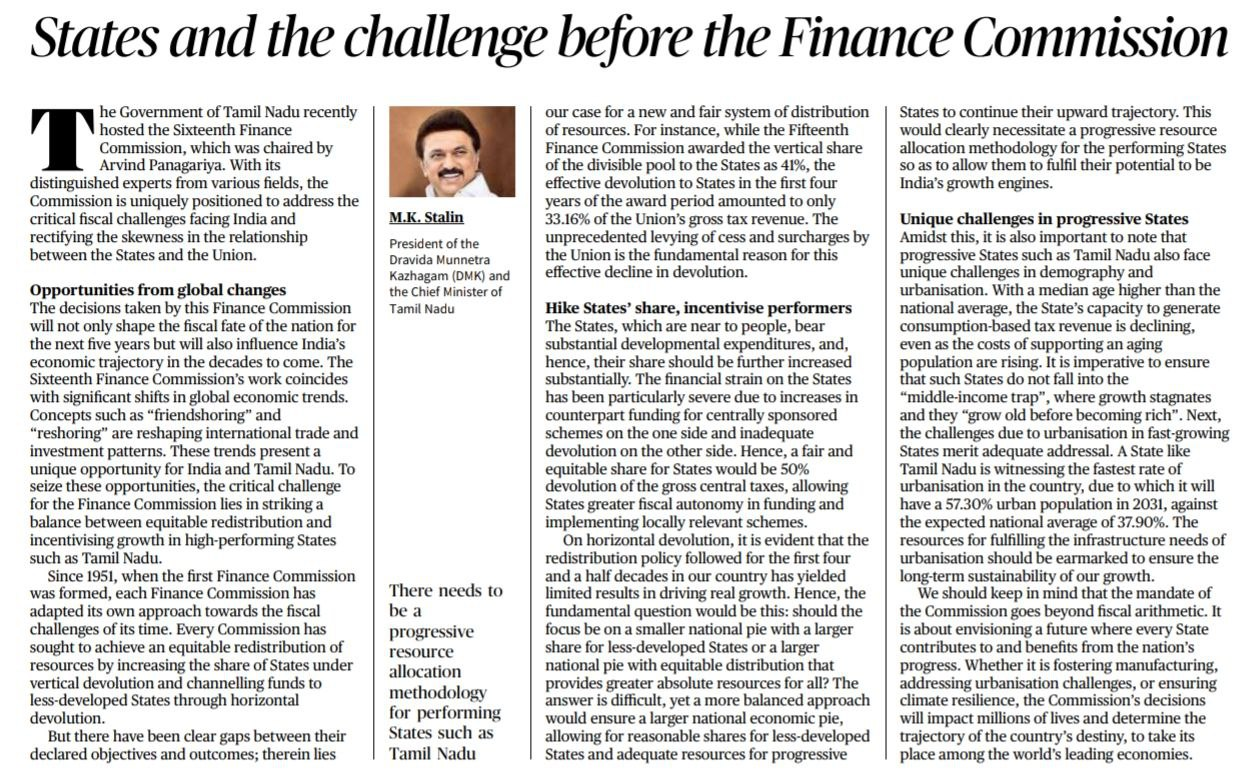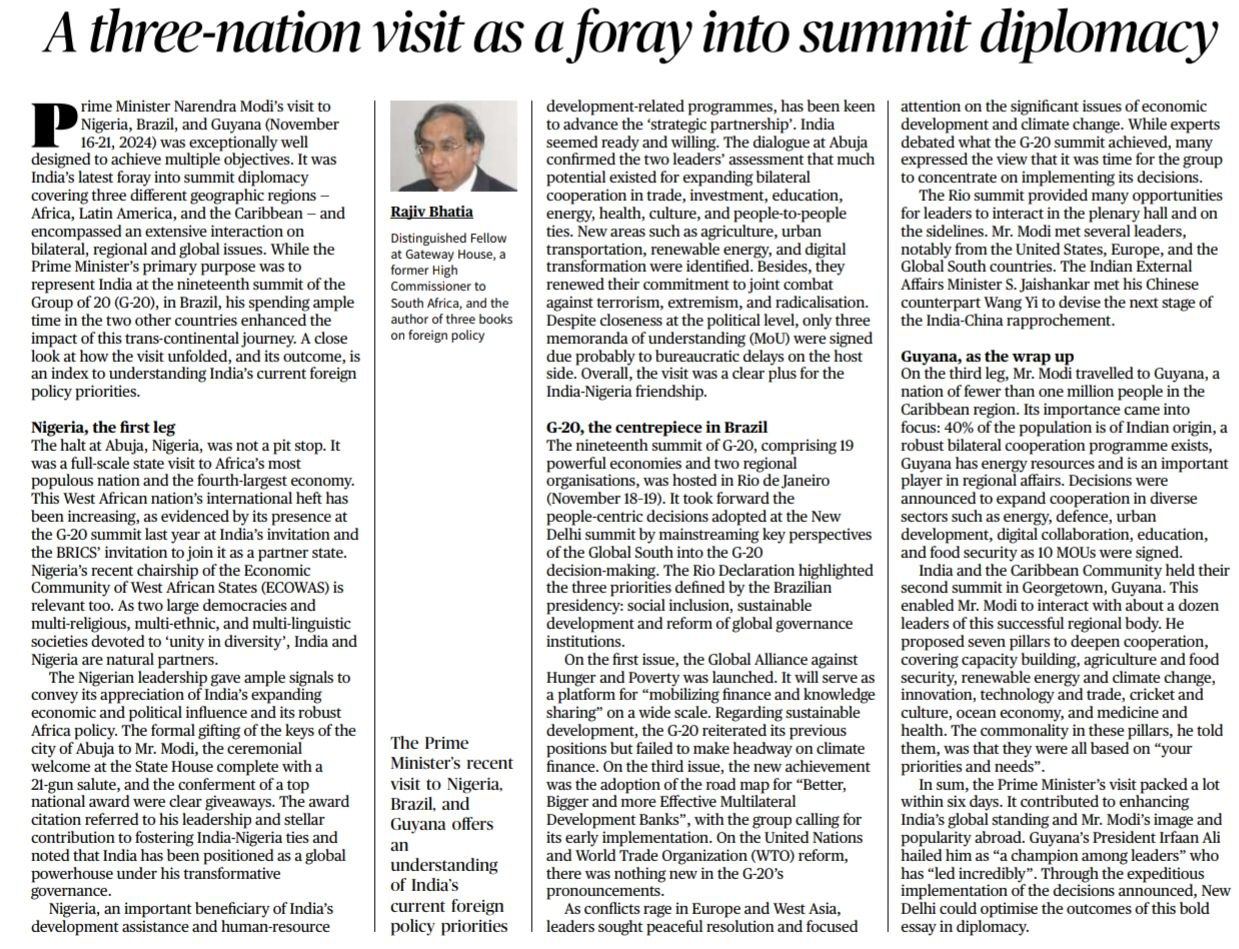1. Challenges in State-Union Fiscal Relations: Insights for the Finance Commission
Introduction:
- The 16th Finance Commission, chaired by Arvind Panagariya, has the crucial task of addressing fiscal challenges in India and correcting imbalances between the Union and States.
- Progressive States like Tamil Nadu face unique fiscal pressures due to structural challenges, necessitating reforms in resource allocation methodologies.
Opportunities from Global Trends:
- Emerging global phenomena such as friend shoring and reshoring are reshaping international trade and investment.
- These shifts provide a unique window for India and States like Tamil Nadu to realign their fiscal policies for sustained growth.
Imbalances in Resource Allocation:
- The 15th Finance Commission allocated a 41% vertical share of divisible taxes to States, but the effective devolution was only 33.16%, impacted by rising cess and surcharges.
- This disparity underscores the need for a new approach to equitably distribute resources.
Increasing States’ Share and Encouraging Performance:
- States manage substantial developmental expenditures and require a larger share of central resources.
- A suggested solution is to raise the share of gross central taxes devolved to States to 50%, allowing them flexibility in funding local initiatives.
- Incentivizing high-performing States like Tamil Nadu can further fuel economic progress.
Challenges Faced by Progressive States:
- Tamil Nadu’s rapid urbanization and aging demographics present fiscal pressures:
- Declining consumption-based tax revenues.
- Escalating costs for urban infrastructure and elder care.
- Avoiding the “middle-income trap” requires equitable resource allocation for fast-growing States to sustain growth trajectories.
Rethinking Horizontal Devolution:
- Current redistribution formulas have failed to yield significant growth in less-developed regions.
- The Commission must balance fiscal equity with economic efficiency by reallocating a larger share to underperforming States while ensuring progressive States receive adequate resources.
Conclusion:
- The Finance Commission’s mandate transcends fiscal arithmetic, envisioning an equitable, growth-oriented future for all States.
- Addressing the unique challenges of high-performing and low-performing States alike is pivotal for India’s sustained economic trajectory.
Mains Practice Question: |
Q. Analyze the fiscal challenges faced by progressive States in India, such as Tamil Nadu, and suggest measures that the Finance Commission can adopt to address these issues.
|
2. India's Strategic Foray into Summit Diplomacy: Nigeria, Brazil, and Guyana
Introduction:
- Prime Minister Narendra Modi’s recent visits to Nigeria, Brazil, and Guyana (November 16–21, 2024) highlighted India’s growing emphasis on summit diplomacy.
- The three-nation tour spanned Africa, Latin America, and the Caribbean, focusing on bolstering India’s bilateral, regional, and global engagements.
Nigeria – Strengthening African Ties:
- Significance: Nigeria is Africa’s most populous nation and the continent’s fourth-largest economy.
- India’s ties with Nigeria were elevated during the visit:
- Nigeria’s growing prominence is marked by its chairmanship of ECOWAS (Economic Community of West African States) and involvement in BRICS.
- The visit underscored India’s commitment to fostering economic and human-resource partnerships in Africa.
- Agreements were signed to enhance bilateral cooperation in agriculture, renewable energy, education, and digital technology.
Brazil – A G20 Powerhouse:
- Focus: Participation in the 19th G20 Summit hosted by Brazil in Rio de Janeiro.
- The summit reinforced India’s leadership in global governance, with discussions on:
- Social inclusion, sustainable development, and energy transitions.
- India’s proposal of the Global Biofuels Alliance gained traction, showcasing its contribution to climate change mitigation and sustainable energy.
- The summit reinforced India’s leadership in global governance, with discussions on:
- PM Modi’s bilateral talks with leaders, including Chinese representatives, hinted at progress in India-China relations.
Guyana – Expanding Caribbean Outreach:
- Importance: Guyana has a large Indian-origin population (40%) and significant energy resources, making it a strategic partner.
- Agreements focused on cooperation in energy, food security, defense, and technology.
- India’s leadership in Guyana signals its growing interest in the Caribbean as a geopolitical region.
Conclusion:
- PM Modi’s three-nation visit reflected India’s multilateralism in foreign policy, balancing its roles in Africa, Latin America, and the Caribbean.
- These engagements highlight India’s aspirations to strengthen its influence on the global stage while addressing regional challenges.
Mains Practice Question: |
Q. Analyze how India’s engagement with Nigeria, Brazil, and Guyana reflects its strategic priorities in foreign policy. Discuss the outcomes of these engagements in enhancing India’s global stature. |



